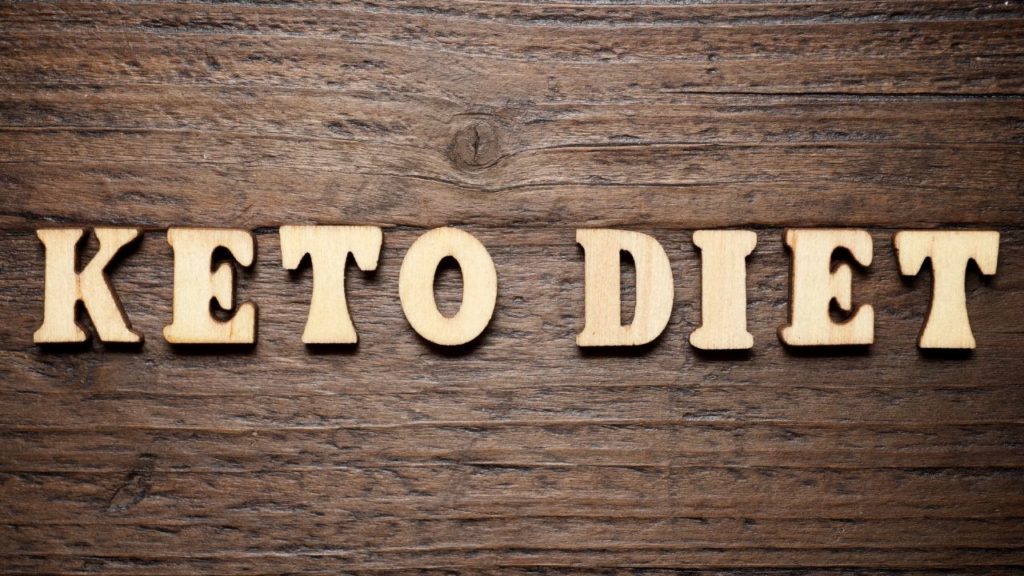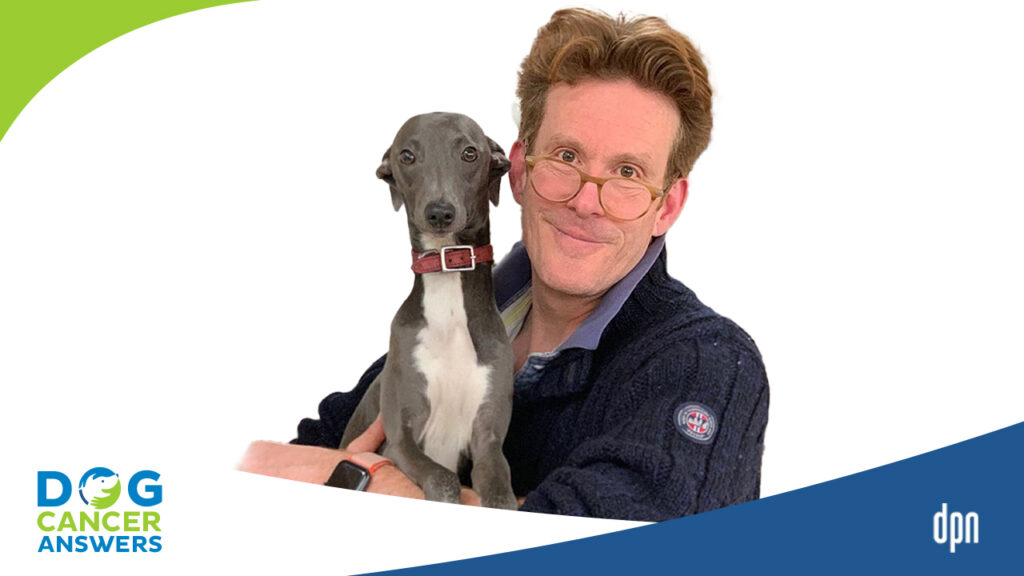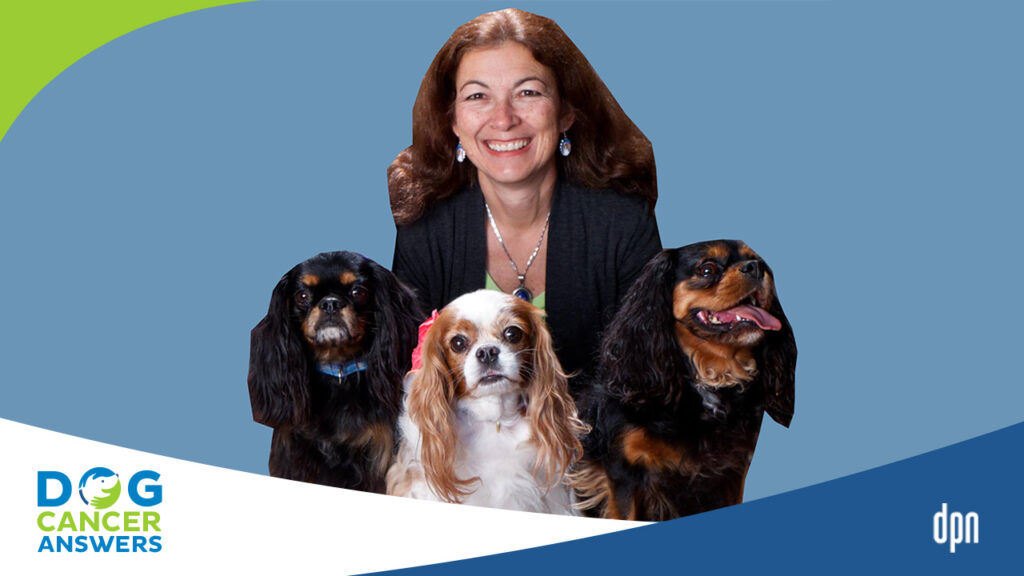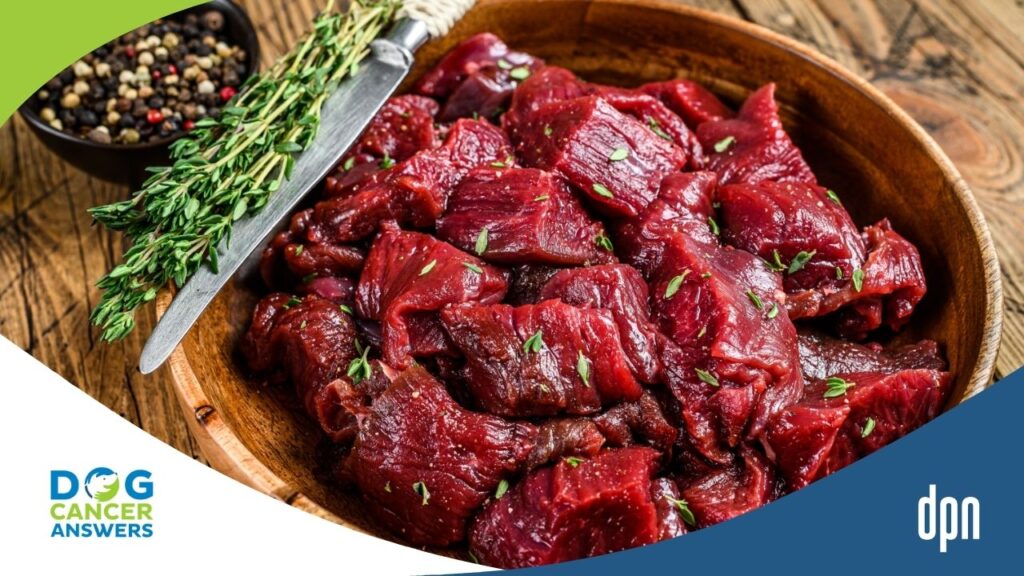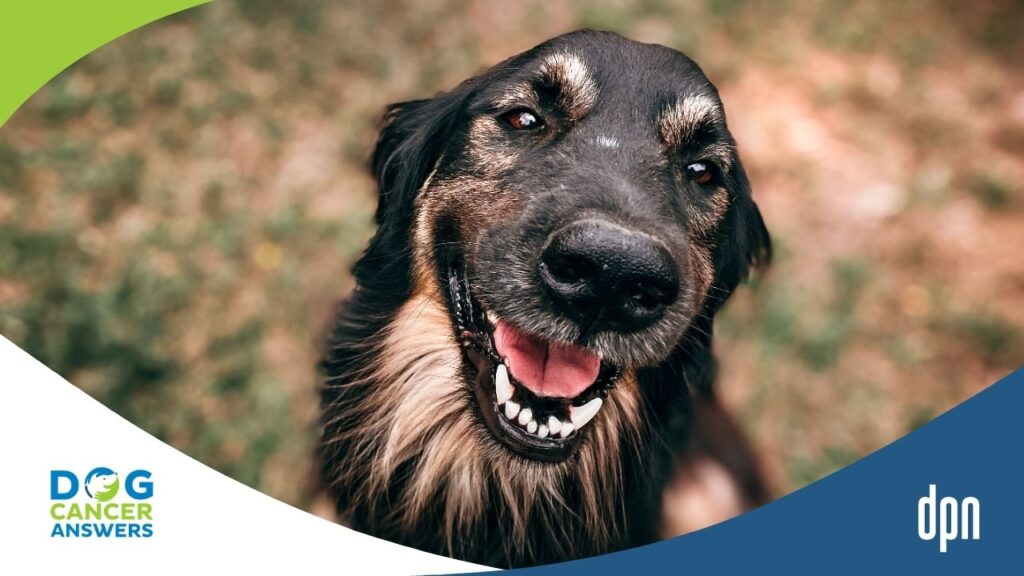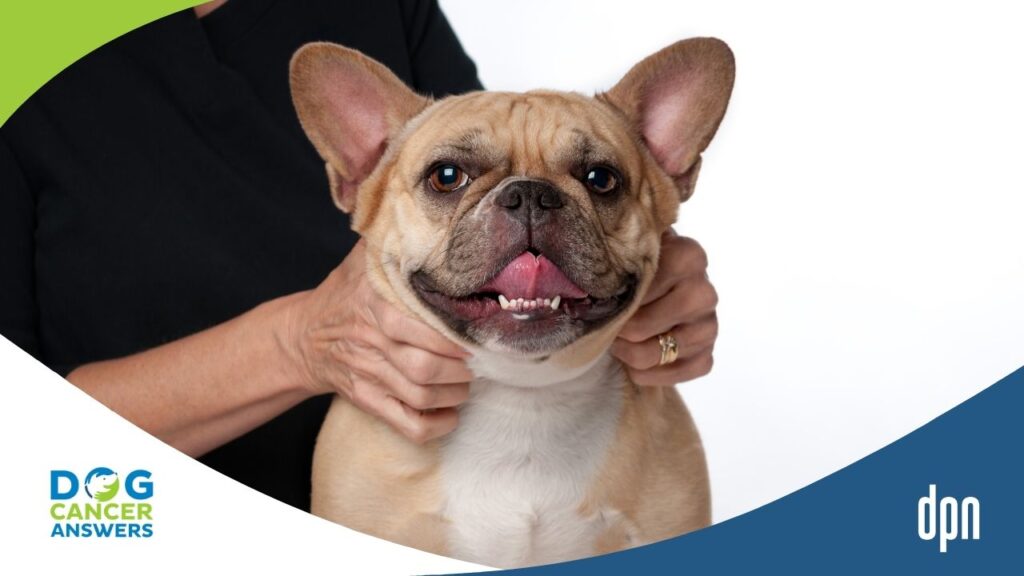EPISODE 44 | RELEASED April 6, 2020
Keto Diet for Dogs with Cancer │ Dr. Demian Dressler Deep Dive
Is a keto diet for dogs with cancer important, and … what is it, exactly? Is it a raw diet, or something more? Dr. Dressler’s Deep Dive helps explain.
SHOW NOTES
Have you heard about a keto diet for dogs with cancer? What about raw diets for dogs with cancer? What does feeding keto actually mean? What does it look like in your kitchen? And why exactly, would you feed raw, or keto? Are there any risks? James Jacobson asks Dr. Demian Dressler, co-author of the book The Dog Cancer Survival Guide: Full Spectrum Treatments to Optimize Your Dog’s Life Quality and Longevity.
You can reach out to Dr. Demian Dressler directly on his veterinary hospital’s website: https://VetinKihei.com.
[00:00:00] >> Dr. Demian Dressler: There are lots of definitions sort of floating around the internet and there’s a lot of different keto diets out there. And so it gets really, really confusing.
[00:00:07] >> Announcer: Welcome to Dog Cancer Answers, where we help you help your dog with cancer. Here’s your host, James Jacobson.
[00:00:16] >> James Jacobson: Aloha. Thanks for joining us. Have you heard about keto diets for dogs with cancer?
[00:00:22] What about raw food diets for dogs with cancer? On today’s episode, we speak with Dr. Demian Dressler about ketogenic diets. We also discussed raw food diet. Because if you’ve been doing online searches, looking around the internet and reading online discussion forums, you’ve probably heard a bit of the hype and enthusiasm for keto and/or raw diets for dogs, especially those who’ve been diagnosed with cancer. Well, what does feeding your dog a keto diet mean? What does it look like in practice? What are the benefits and what are the risks? We’ll be discussing all of that today.
[00:01:05] Dr. Demian Dressler is co-author of the bestselling book, The Dog Cancer Survival Guide. He is a graduate of Cornell School of Veterinary Medicine. And he’s been in private practice since 1997. Dr. Dressler, welcome to the show.
[00:01:19] >> Dr. Demian Dressler: Thank you so much.
[00:01:20] >> James Jacobson: So today we are gonna talk about this thing that is all the rage today on the internet, which is uh, keto diets for dog cancer. First of all, what is a keto? What is keto? What is a keto diet?
[00:01:31] >> Dr. Demian Dressler: Well, there are lots of definitions sort of floating around the internet and there’s a lot of different keto diets out there and a lot of different homemade keto recipes and a lot of different commercial dog foods that represent themselves as keto diet.
[00:01:43] So it gets really, really confusing. So when I first started tackling this question, I realize that because there’s so much variation, it’s becoming more and more difficult to differentiate what’s a keto diet and what’s not a keto diet? So what I found and according to the science, the true definition of a keto diet is one that stimulates fat breakdown so that very small molecules called ketones, or ketone bodies, are elevated in the blood. And that’s really the defining characteristic of a keto diet. It changes the metabolism, such that fat is broken down, the breakdown products of fat, which it can then be used for energy are elevated in the blood and those are called ketones.
[00:02:20] >> James Jacobson: So why is it such the rage these days? Why are people talking about it so much?
[00:02:24] >> Dr. Demian Dressler: Well, because there’s been a lot of benefit demonstrated in people. So when people go on a keto diet, they experience weight loss, increased energy. And they feel good. And because of that experience, I think it’s very natural for us being dog lovers, to look at our dogs and say, well, gee, this is a good thing for me.
[00:02:44] And I’m hearing about this all over the place. So it’s kind of trendy. It’s very natural in the same way that we might think of it for a person then for a canine companions, because for real dog lovers, these are family members. And so why not? Why not start looking at this for our dogs because we see the same exact trends in many other areas of life.
[00:03:01] >> James Jacobson: So, does it apply equally in people and dogs?
[00:03:04] >> Dr. Demian Dressler: Well, the information right now is still a little bit limited in dogs because it’s brand new. And so I think though, if you look at the basic physiology and fault, I think you can extrapolate and make educated guesses that there are a lot of positive things that a dog can benefit from by using a keto diet.
[00:03:22] But it is a little bit problematic though, because it becomes difficult to define exactly what are we talking about. So if you look at, for example, keto recipes online, well, some of them have probiotics and some of them don’t and some of them have vegetables and some of them don’t and some of them are raw and some are not raw.
[00:03:40] So it becomes very tricky because the vocabulary that we’re using, nobody is quite sure even what the word means. And so it becomes difficult to really answer the question. There are good things though, about a keto diet. There are some publications that show us that dogs having seizures can benefit from a keto diet.
[00:03:58] >> James Jacobson: Seizures.
[00:03:59] >> Dr. Demian Dressler: Seizure control, right. And then in lab animals, which is rodents, and in people, there are publications that a keto diet can be beneficial for cancer. In other words, we can see lower side effects in relation to the conventional treatments, which are chemotherapy and radiation. And we have increased lifespans or expected life expectancies in some cases. Although the evidence is a little bit mixed and I’ll get to that in just a minute.
[00:04:24] >> James Jacobson: Yeah. ‘Cause I was going to ask you what the bad parts are. So those are the good pieces. Now, when you’re talking about seizures, obviously that’s not with cancer because most of our listeners are dealing with a dog that has been diagnosed with cancer.
[00:04:36] So the raw piece, what is that? ‘Cause that seems to be so connected. And so convoluted with keto. Is keto raw? Is raw keto?
[00:04:45] >> Dr. Demian Dressler: Well, again, we’re struggling with the definition of a keto diet. Keto stands for ketones. Ketones are simply what I described. It’s breakdown products of fat. Those can be elevated. They can also be elevated by the way, in certain disease states like diabetes.
[00:05:00] If they get too high, you get ketoacidosis. That’s not a good thing because that creates too much acid in the blood and that’s why advanced diabetics get sick. So we’ve got a difference by the way, between simply elevated ketones in the bloodstream, which up to a certain point, the body can handle it. And then beyond that, we create ketoacidosis, which is an acid overload state seen in diabetes and also in severe starvation. And that’s an unhealthy state, but backing up the only thing that we can really identify that’s part and parcel of a keto diet is that the diet is structured in such a way that accelerates fat burning and increases blood ketones.
[00:05:39] And so all of the things that we’re seeing online, they’re conflating raw with keto really have nothing to do with one another when you look at them scientifically.
[00:05:50] >> James Jacobson: Because you’re not a fan of raw diet for dogs that have cancer.
[00:05:54] >> Dr. Demian Dressler: Well, that deserves some clarification I think.
[00:05:56] >> James Jacobson: Okay.
[00:05:57] >> Dr. Demian Dressler: ‘Cause that also is a complex question.
[00:06:00] So backing up, we say, why would somebody come up with the idea of a raw diet in the first place? Well, when we look out in nature, we see that dogs don’t cook their food. And so they’re eating raw food. And so it would make sense if we were to argue that millennia of evolution created a circumstance where dogs’ bodies were better adapted for raw diet because dogs became domesticated give or take about 40,000 years ago, that’s the first evidence of that type of companionship between human beings and dogs. But there were many, many, many tens of thousands of years prior to that, that dogs were evolving in the natural world. And that evolution probably suits consumption of a raw diet because people aren’t cooking food during all that time.
[00:06:47] So their bodies do seem to be, from an evolutionary standpoint, more adapted for the raw food that they would be killing themselves and eating out in the wild. So that’s kind of the argument for nature, but it can be a little bit faulty for a couple of reasons. One is not everything that occurs in nature is actually good for us.
[00:07:07] There are many things that we find in the natural world that are not good things. And if we emulate what happens in the natural world as kind of a broad sweeping statement of natural equals good, we’ll find that that’s really not true at all. For example, there are many plants out there that are natural and they will absolutely kill you dead if you eat just a little bit.
[00:07:29] >> James Jacobson: Right.
[00:07:29] >> Dr. Demian Dressler: And those are very natural. So natural is not always good. That’s false. And when we’re looking at medical intervention, well, when do we need medical intervention? That’s when the body isn’t doing enough to overwhelm the problem. That’s why we need things like medical intervention. So if we’re going to adopt a position of stewardship that is caring for our dogs and guardianship, and they’re sick, the reason why they’re sick is because their bodies have not been able to cope with it successfully.
[00:07:58] In many times, that’s not the case. Many times mother nature will be able to handle it. So now we’re in a situation where what’s present naturally is insufficient to address the problem. Now we’re in a different box because things are distorted in that box relative to quote unquote, what is natural.
[00:08:13] >> James Jacobson: Because your dog has cancer.
[00:08:14] >> Dr. Demian Dressler: Your dog has cancer.
[00:08:15] And if it weren’t for things that you would be doing, your dog would be dead very shortly. So now we’ve stepped out of a kind of natural context. Now we’re intervening. And the physiologic changes that we see in that box are not those that we see in nature because the animal would be dead. So we’re entering an artificially supported or a man created new environment where the rules of the game are not quite the same.
[00:08:43] The physiology is not the same. And the rules of engagement are not the same. Cause and effect are not the same as it would be in natural world because the animal would be dead. So now we have a living animal that we’re supporting. Physiology is different, so we do different things. So if we got cancer, cancer has a spectrum.
[00:09:01] So we’ve got healthy bodies that can have developing cancer cells in them, those are stem cells, without cancer. So, where do we draw the line? When you get enough of those cancerous cells that are behaving aggressively? And the cancer burden is such that we start to be able to detect those cells, we say, we have cancer. But it could be like a woman who goes to the doctor and they find a lump on the breast and it turns out to be malignant, that’s breast cancer, that woman is out there playing tennis. She’s going to the event on the Friday night. She’s golfing and going on vacation and having a family, successful career, whatever. She’s fine. But the cancer cell burden is low. When the cancer cell burden goes up to a certain extent, she becomes sick because the cancer cells will start to invade the organs and disrupt the normal body processes that you need to sustain life.
[00:09:50] So dogs are the exact same way. So one of the problems that we see with raw diet, in advanced cancer cases, is those animals are by definition, immune suppressed. Their immune system is not where it needs to be.
[00:10:04] >> James Jacobson: Because if the immune system had been totally functioning, the cancer probably wouldn’t have taken hold.
[00:10:09] >> Dr. Demian Dressler: I think that’s true, most of the time. Cancers will evade immune destruction. And when they’re able to do that successfully, that’s one of the ways that you can have proliferation of these cancer cells. So an immune compromised dog who is weakened, I am concerned about the use of raw foods due to the presence of bacteria that could conceivably be disease causing in an abnormal dog.
[00:10:35] >> James Jacobson: Okay.
[00:10:36] >> Dr. Demian Dressler: So there’s a difference between a dog that is suffering from advanced cancer and a dog that has a little bump on its skin, like the woman’s breast bump, that is not yet creating a real metabolic load or strain on the animal. They’re fine. It’s a little BB. There’s a few cancer cells in the body. The rest of the body is doing fine.
[00:10:54] It’s like, can you drive a car with a little bit low tire pressure? Well, yeah, but if you have a flat tire, we’ll know you’re going off the road. So cancer cells are the exact same way. So in cases where the animal is not dilapidated and the immune compromised is not there, I really honestly don’t have a problem with raw diets at all.
[00:11:13] As a matter of fact, there are a lot of things that are really good about them. For example, they do not contain high levels of carcinogens that you see through high cooking temperatures. When we eat food that is produced and this is in both in humans and in dogs, above a little over 200 degrees, we see the production of carcinogens.
[00:11:31] And so there’s a benefit to avoiding those things, both if you don’t have cancer, or if you do have cancer. Cancer cell DNA is unstable and the constant exposure to continual carcinogens favors further mutations and further resistance to treatment because cancer does change over time. And that’s one of the reasons why, when you do things like chemo, you get resistance, the cancer is changing. So feeding that situation with a DNA mutating substance, like a carcinogen created by high cooking temperatures is not the best scenario for an animal.
[00:12:03] >> James Jacobson: So that’s a general thing. So this is where it gets a little confusing. So you’re not necessarily pooh-poohing raw diets in general. You just don’t think they should be used as part of a dog cancer.
[00:12:13] >> Dr. Demian Dressler: For advanced cancer cases. If you go back and you look at what I’ve written concerning a Dog Cancer Diet in The Dog Cancer Survival Guide, what one has to do when you write a book is create a book basically as a cookie cutter body of information that will apply most of the time pretty well. It has to be a generality. And one of the things one has to do is not create a problem when you’re putting information out there to the general public. And by now there’s been quite a number of people who have read that book. And if I were to say raw diets are okay, the bad effect of that in cases where these animals got sick, because they had immune compromise would be substantial even if it was not the majority of dogs out there who had cancer. So I have to above all do no harm. That’s part of your medical training.
[00:12:58] >> James Jacobson: Okay. And this is probably a really good place to take a break and hear a message from our sponsor. We’re speaking with Dr. Demian Dressler. When we come back, I’m gonna ask Dr. Dressler what he sees as the risks and the downsides of the keto diet. Stay tuned.
[00:13:18] Dog Cancer Answers is brought to you by the best-selling animal health book, The Dog Cancer Survival Guide: Full Spectrum Treatments to Optimize Your Dog’s Life Quality and Longevity by Dr. Demian Dressler, who you’ve been listening to, and Dr. Susan Ettinger, who is a veterinary oncologist in New York. And in a minute, I will tell you how to get their book at a discount.
[00:13:39] The book covers so much, including everything that you need to know about conventional veterinary treatments. Things like surgery and chemotherapy and radiation, including how to reduce their side effects. The book covers the most effective non-conventional options, including botanical nutraceuticals and supplements, nutrition, and mind, body medicine.
[00:14:02] And this is my favorite part, the book covers how to analyze options and develop a specific plan for your own dog based on your dog’s type of cancer and your dog’s age and your financial budget and your time constraints as well as your personality. The book’\s available, wherever fine books are sold, both online and in physical bookstores and The Dog Cancer Survival Guide is a 500 page book that has been described as the bible of dog cancer.
[00:14:32] It offers everything you need to know to help your dog, but if you would like to help support this podcast and get a copy of The Dog Cancer Survival Guide, do it right away by ordering direct from the publisher. It’s available in paperback and there’s free shipping anywhere in the United States. There’s also an e-book edition that is under $10. The website to get either the paperback or the e-book or both, and I know some dog lovers who get both, is www.DogCancerBook.com. And because you are a listener of this podcast, you can save 10% if you use the promo code PODCAST, when you check out, you’ll save 10%. The website again, DogCancerBook.com. Use the promo code PODCAST for 10% off, that is www.DogCancerBook.com.
[00:15:27] So I think we’ve addressed the raw issue. Let’s go back to the keto piece. What are the bad things about keto? What are the things that you don’t like about this quote unquote keto rage that’s going on?
[00:15:37] >> Dr. Demian Dressler: Well, okay. So if we look at, and I’m out of my depth on the human side, so I’ll stick with what I’m seeing on the veterinary side.
[00:15:43] First of all, it’s being used as a marketing element, which I’m not particularly fond of because it’s a buzzword. And whenever we have buzzwords that tends to attract eyes and so you can sell more product, there’s absolutely no regulation on what’s a keto diet and what’s not a keto diet. Anybody can say that I’ve got a keto diet.
[00:16:00] So that’s the first thing. I’m not fond of that. You have to be careful. And the second thing about a keto diet that I’m not all that fond of, is that, I guess there’s a proprietary thing or a, how shall I say, authorship issue. A lot of what I see in the keto diets are actually repackaged Dog Cancer Diet taken from The Dog Cancer Survival Guide.
[00:16:19] >> James Jacobson: I was gonna get to that. So yeah, it’s literally taking stuff that you’ve been calling the Dog Cancer Diet that has been vetted by a number of veterinary animal nutritionist over the years and being repurposed as keto, with a little rock component, or, or what?
[00:16:33] >> Dr. Demian Dressler: Yeah. So for example, the cancer-fighting ingredients that we talk about in the Dog Cancer Diet, which are things like the cruciferous vegetables, which are things like garlic, mung beans, other things, things that you can prepare at home to provide your dog, and yourself incidentally, with naturally occurring anti-cancer compounds.
[00:16:51] Those are now kind of being brought in compacted into, or under this label of keto. And they’ve really got absolutely nothing to do with keto whatsoever. So one thing I really don’t like is that there’s this creation of public confusion and literally misinformation because cancer-fighting ingredients have zero to do with raising blood ketones.
[00:17:13] They’re absolutely not the same. The addition of probiotics and prebiotics, which are beneficial for dogs with cancer and beneficial for dogs in general, has absolutely nothing to do with ketones. So there’s a bunch of confusion being produced and it’s an economic issue. And I don’t like that.
[00:17:30] Furthermore, when we’re actually inducing ketosis on an animal that creates the liberation of these ketone bodies in the blood. So how do you do that, by the way? You limit your carbohydrate intake, severely. So the body shifts, and this happens in dogs too, to a fat burning mode because it doesn’t have the sugars and starches available for fuel.
[00:17:49] And the protein content is modest. So what happens here is the animal then shifts so that the fats are being used for fuel. So what’s good about that? Well, it’s carbohydrate restricted and one of the hallmarks of cancer almost across the board is they have what’s called a glycolytic phenotype, which means they use sugar.
[00:18:05] >> James Jacobson: Cancer feeds on sugar.
[00:18:07] >> Dr. Demian Dressler: They feed on sugar and that’s their preferred fuel. And the reason why is because they’re characterized by what’s called the glycolytic phenotype. Glycolytic refers to the breaking down of sugar, glucose. That’s been known since the thirties and a guy named Otto Warburg discovered that and it’s actually called the Warburg Effect and he won a Nobel prize for it.
[00:18:24] For some strange reason, that’s been completely ignored in modern oncology. And I’m really puzzled as to why that is, because if you go and you look at the evidence, both on the human side and as well as in the lab, in laboratory animals, animals that are on a carbohydrate restricted diet live longer and do better when they have cancer.
[00:18:41] And probably when they have other things as well. It turns out carbohydrates are not really our friend in many ways.
[00:18:45] >> James Jacobson: So this is where it sounds like you do like keto, but this is, explain that.
[00:18:50] >> Dr. Demian Dressler: Okay.
[00:18:50] >> James Jacobson: This is where It gets really confusing for the lay person.
[00:18:53] >> Dr. Demian Dressler: Because there is overlap between, for example, the diet in The Dog Cancer Survival Guide, which is a carbohydrate restricted diet and the keto diets, there’s a lot of the same stuff going on because they’re actually in many ways, very, very, very similar diets. However, if we starve the body from carbohydrates, if we withhold carbohydrates to such an extreme of extent where we have a high levels of ketones in the blood, that would be a keto diet.
[00:19:18] Now, if we do that slightly less, where we have just a little bit of ketones or no ketone, Yeah, we’re starving cancer cells, well, that’s what I call a carbohydrate restricted diet. So there’s a difference. It’s like, is it super, super, super extreme or is it just modestly extreme if that’s not a contradiction. Now here’s the funny thing though. Here’s what nobody seems to be paying attention to. Ketones, it turns out are a secondary fuel source for many cancer cells.
[00:19:46] >> James Jacobson: What?
[00:19:47] >> Dr. Demian Dressler: That’s right. Ketones are a secondary fuel source for many cancer cells.
[00:19:51] >> James Jacobson: So the goal of ketosis is to create more ketones in the blood. And you’re saying that’s a secondary fuel source behind sugar.
[00:19:58] >> Dr. Demian Dressler: Right.
[00:20:00] >> James Jacobson: Oh.
[00:20:00] >> Dr. Demian Dressler: That’s right.
[00:20:01] >> James Jacobson: So does that mean keto diets are bad for cancer?
[00:20:04] >> Dr. Demian Dressler: Well, I don’t recommend inducing ketosis from the technical standpoint. And the technical standpoint is the only thing that really can define what a keto diet is, is if you measure the urine and blood ketones.
[00:20:15] >> James Jacobson: Which is sort of the whole thing. And people are measuring their dog’s blood with keto strips and.
[00:20:19] >> Dr. Demian Dressler: Right.
[00:20:19] >> James Jacobson: And urine strips and all that stuff. Yeah.
[00:20:21] >> Dr. Demian Dressler: So now on the average, now we have to be careful with the language, my language. It is not true that all cancers use ketone bodies and it stimulates their cell growth. That’s not true. But it is true some of the time. And you see it in test tubes and Petri dishes, for sure, for several different cancer types and I’ve seen at least one article that shows that it stimulated the growth of certain kidney cancers. But if you’re gonna take a guess more of the time that this carbohydrate restriction will benefit and the cancer cells are not as able to use the ketones and you’re gonna be okay. So more times than not, you’re okay with a keto diet not because you’re specifically inducing ketones, in my opinion, but because you’re restricting carbohydrates, which is not new information.
[00:21:07] >> James Jacobson: Wow. Okay. So to summarize it, basically, you’re saying you should feed a carbohydrate restricted diet, like what’s in the Dog Cancer Diet and probably stay away from a keto diet if your dog has cancer.
[00:21:21] >> Dr. Demian Dressler: Well, I don’t push induction of ketones as a cancer fighting goal. I don’t think that that’s an appropriate perspective and focus because, for a couple of different reasons, one, it has to be well-controlled. So say you have, for example, a very overweight dog and say you really starved that dog for long periods of time. Well, you’re gonna have a lot of ketones and you gotta keep the ketones to a certain limited level because you could conceivably induce ketosis, which is not a healthy state. They can usually tolerate long-term fasting and long.
[00:21:53] >> James Jacobson: You mean ketosis? Or do you mean you keto?
[00:21:56] >> Dr. Demian Dressler: Ketoacidosis.
[00:21:57] >> James Jacobson: Ketoacidosis. Okay.
[00:21:58] >> Dr. Demian Dressler: Yeah, that’s a pretty unusual scenario, but you’ll see, like if you fast yourself, you’ll have this feeling of being sick. And it will create a headachy type of low energy feeling. That’s the ketone bodies, accumulating your body, has a certain threshold in which it can handle that or not. People will talk about that as quote unquote detox, and really it’s the ketones creating that feeling of the body, that headachey, low energy feeling.
[00:22:23] And you have to be a little bit careful for example, when you have a dog who’s like, who’s really pretty sick. Sometimes that’s not beneficial ’cause remember we’re in an artificial state when we’re supporting an animal that has a severe illness because in nature, the natural state, that animal would be dead.
[00:22:40] So the rules don’t all apply. Now, if we look again at that nature is good argument. Like for example, I see some people out there saying, okay, fasting is what everybody ought to do, including your dogs, intermittent fasting. Okay, that’s true up to a certain point or a keto diet is good for dogs across the board.
[00:22:57] That’s true up to a certain point, but not in excess and not in extreme. Now, how do you induce by the way, ketosis in a dog? The way you do it is by feeding a diet that’s much higher in fat because you got to get the calories in there some other way. And you’re, you’re doing almost absolute carbohydrate restriction.
[00:23:15] So if anybody out there has ever seen animals in the wild. I will give you one free copy of The Dog Cancer Survival Guide, which you already have. If you can send me a picture of a fat animal out in the wild, that would be eaten by another animal, such as a dog. There are no fat animals in the wild. They are not fat.
[00:23:37] Well, I guess maybe blubber, well you know, maybe some of these marine mammals or something like that, but dogs are not able to kill those as their natural food, because they’re not that good at swimming. Therefore, a high-fat diet is absolutely not natural. So all of those people out there, I would like to point that out to you, especially people that are promoting this as the natural way, feeding high-fat is absolutely not natural. So I think that there is a big contradiction there. And I think that, again, the effort in promoting this type of thinking is leading to a lot of confusion and the ones who suffer for it are the dogs.
[00:24:16] >> James Jacobson: Okay. Dr. Dressler, thank you again. If you’d like to get a copy of Dr. Dressler’s, Dog Cancer Diet, it’s in the show notes for this episode at DogCancerAnswers.com/keto. Thank you, Dr. Dressler.
[00:24:29] >> Dr. Demian Dressler: Thank you.
[00:24:31] >> James Jacobson: That is about all we have time for today, but please join us on our next episode where one of our veterinarian guests will be answering listener questions about dog cancer. And if you’d like to ask a question for one of our future episodes, just call our listener line at (808) 868-3200 or visit our website at DogCancerAnswers.com. That phone number again, (808) 868-3200.
[00:25:00] Now I want to talk to you for a brief moment about subscribing to podcasts. Now it may not be relevant if you are a devout podcast listener and really understand all your things about RSS feeds and everything. But I know that a lot of our listeners are newbie podcast listeners, and I want to explain the benefits of subscribing to our podcast in whatever tool you use to subscribe. First of all, it is free. No charge. Second of all, you can have immediate access to all of our past and future shows.
[00:25:34] They’ll just show up in your feed. And what’s good about that is on this season of the podcast series, we’re gonna be doing a lot of these Q and A episodes. And quite honestly, you may not want to listen to every single Q and A show, but it’s good to have them in your feed because you can decide, based on the title, whether it’s relevant to your situation.
[00:25:55] And you can only do that if you have that in your podcast feed. Also, if you subscribe, you will be able to get our deep dive episodes for all of the season, both episodes that we’ve already run and the episodes that we’re going to run, and those are on subjects that are relevant to most dog lovers, such as CBD and hemp products for treating dog cancer and pain management for dog cancer and when not to treat your dog’s cancer. So lots of shows coming up that I want to make sure you do get by subscribing. How do use subscribe? Well, you can do it in Apple Podcasts or wherever you’re listening now. And if you need some help, there are more details on how to subscribe, step-by-step, very simple, on our website at DogCancerAnswers.com/subscribe.
[00:26:42] Subscribing and rating us wherever you listen is important, but actually there is something that is even more important to help us grow our podcast audience. If you like this show and found it beneficial, please tell your friends and even your veterinarian and the vet staff about this podcast. That is the best way to help us grow our community and our reach so that we can help as many dog lovers as possible. And speaking of community, you can join us in our private Facebook group. You can get all the details on our website at DogCancerAnswers.com/facebook. We’re on many of the social media channels, including Facebook and YouTube.
[00:27:24] Please visit our main site at DogCancerAnswers.com to get those links and show notes from today’s episode. If you want to get a direct link to today’s show notes, including where you can pick up a free copy of Dr. Dressler’s Dog Cancer Diet that he mentioned, you can find all of that at DogCancerAnswers.com/keto.
[00:27:44] We’d like to thank our sponsor, The Dog Cancer Survival Guide by Demian Dressler and Susan Ettinger. The book is available wherever fine books are sold. If you’d like to support this podcast, get it right away, direct from the publisher and save yourself some money. And because you’re a listener, you can use the promo code PODCAST and save 10%. The website, DogCancerBook.com. Use the promo code PODCAST for 10% off. That is www.DogCancerBook.com.
[00:28:13] I’d like to thank Dr. Dressler for being our guest today. If you’d like to reach him directly, his website link is a VetInKihei.com. That’s VetInKihei, K-I-H-E-I.com. If you’d like to download a complimentary copy of the Dog Cancer Diet, as I mentioned, you can go to DogCancerAnswers.com/keto and get all of the links to everything at Dog Cancer Answers. Until next time I’m James Jacobson from all of us here at Dog Cancer Answers, I wish you and your dog, a warm, Aloha.
[00:28:51] >> Announcer: Thank you for listening to Dog Cancer Answers. If you’d like to connect, please visit our website at DogCancerAnswers.com or call our listener line at (808) 868-3200. And here’s a friendly reminder that you probably already know, this podcast is provided for informational and educational purposes only. It’s not meant to take the place of the advice you received from your dog’s veterinarian.
[00:29:14] Only veterinarians who examine your dog can give you veterinary advice or diagnose your dog’s medical condition. Your reliance on the information you hear on this podcast is solely at your own risk. If your dog has a specific health problem, contact your veterinarian. Also, please keep in mind that veterinary information can change rapidly, therefore, some information may be out of date. Dog Cancer Answers is a presentation of Maui Media in association with Dog Podcast Network.
Hosted By
SUBSCRIBE ON YOUR FAVORITE PLATFORM
Topics
Editor's Picks
CATEGORY


